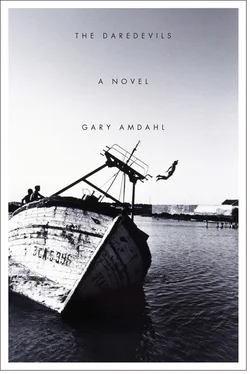“Certainly I was sick and crazy as a child, and I can say now just as certainly that I felt something in me call out for it, daydream about it without saying its name, imagine circumstances, maybe other worlds, maybe an ideal world, ominously enough, prophetically enough, in which I might indulge myself in this nameless desire. but I tell you, my friends, what makes me burst out in tears of grief and loneliness is the knowledge that I have gone on for so long feeling free, acting as if I were free, only to find out that I am not. Oh, it’s a question I can’t answer! I can tell you I resisted it, that I resisted all gross pleasures and extreme pursuits. Alcohol and tobacco and firearms. Meat. I thought purity was called for. Purity of limb and thought. It may have been an elaborate disguise for a fear that I was in some way being controlled, but how can I think of something as artificial as rectitude when the world is upside down? How can I be pure when I can see with my own eyes that there is nothing pure, that there has been nothing pure in the history of creation! And is not the seeking of purity, friends and neighbors, just an elaborate disguise for terror? What do you miss when you seek purity? Poetry from your life and passion from your politics? I mean real passion, not the costumes and soliloquies and power. Oh, ladies and gentlemen, I lived in New York once, for a very little while, and I knew the bliss of art, the peace that it brings. So yes, I say, opium yes, and whiskey yes, and cigarettes and pistols and Coleridge and Baudelaire and and and Edgar Allen Poe ! I am twenty-one years old and I lecture, mostly to myself now, like some pompous magister-cum-tyrant in a gown, of freedom, but—” and she began to cry again, because she was quoting someone who was dead, more or less verbatim, “but the truth, ha ha, is that I am a slave to a world of simple objects and superficial perception and mechanical thought and naïve ideals. If I’m not a terrorist it’s because I’m a coward.”
As if she’d not made her extraordinary speech, the man who had been so insistent about King Umberto said, “Don’t give up your ideals. God, this cocaine is wearing off already!”
“Oh, the world is rich and strange and horrifying and mute and I have confined myself to newsprint in the tiniest of fonts,” Vera continued to rave, as if the man who’d interrupted her had not spoken after all. “Doctrine and frankly bourgeois comforts. I want the revolution to be like the fall of Nineveh, the feast of Belshazzar, strong red wine in heavy golden goblets, clothes of scarlet silk, a spectral hand writing on the walls of the homes of these vicious assholes: GOD HATH NUMBERED THY KINGDOM AND FINISHED IT, THOU ART WEIGHED IN THE BALANCE AND FOUND WANTING, THY KINGDOM IS DIVIDED AND GIVEN TO THE INDUSTRIAL WORKERS OF THE WORLD!”
Everybody in the big back room of the Oregon House applauded and whistled and cheered. “I am either a block of lead, friends and neighbors and citizens, or a nervous bird and I am tired of it. I want to hear music in every waterfall. I want to see time going backward as well as forward: ‘the dark backward and abysm of time,’ I want that, I want that badly! I want the past, the present, the future! Life, as we have lived it, comrades, is meaningless. It is a life that has been recommended to us, forced upon us when we balked, by people who do not care if we are happy or even alive, so long as there are others in line behind us. Therefore and in conclusion: opium, whiskey, pistols, and dynamite!”
It was not her last speech of the night.
Charles was braced in a cone of yellow light over a large relief map of Minnesota, the Dakotas to the river, Wisconsin, and the Upper Peninsula of Michigan. Vera threw open the door and it came back at her, knocking her sideways a good distance. The doorway jumped to the left and jumped to the right, but she made her way in, only to have the spring-loaded floor fly up and slap her in the face. Later, he told her that she tried to speak, but I hadn’t been able to make out the language. “You were slick and pale and but looked, somehow, contented and amused.”
“I made great speeches at the Oregon House,” she said blearily but proudly.
“And then you vomited.”
“When was this?”
“Just a bit ago. I was there and then I came here.”
Charles cleaned her up with looming movements and sounds and tucked her in bed. The next day he told her that because of the slapstick theatrics of her entry, she probably hadn’t noticed Daisy sleeping on the couch.
“No, no,” said Vera. “I saw her.”
“She says she has the job.”
“Job?”
“Traveling. Speaking. It’s planned and waiting to happen.”
“Oh no. ”
‘“Oh no’?”
“This is what everybody’s been waiting for.”
“As I said. Why ‘oh no’?”
“Because I am unwell.”
“Who is everybody?”
“What kind of question is that? I’ve got a headache. Leave me alone.”
“Everybody must include me. What have I been waiting for?”
“Once again a terrific question that I cannot help you with.”
“Vera, please, you are mistaking me for one of your pinheaded nihilists. Just because I don’t think any of this is real doesn’t mean I am indifferent to things everybody is waiting for. I am not apolitical or amoral. I am my father’s son in more ways than I am not. I think I have demonstrated as much pretty persuasively in the last few months. Have I not? Vera? Have I not?”
“Charles, I love you. Don’t you understand what that means?”
“No, not at all.”
“I couldn’t love, wouldn’t love you, if I didn’t know what was in your heart.”
“What’s in my heart?”
“Love.”
“Whatever you call it, it’s as illusory as everything else.”
“If you say so.”
“Well, how can I not and remain honest?”
“I don’t know.”
“I can’t.”
“If you say so.”
“Well, you must. Please.”
“I tell you my head hurts horribly and—”
“Head hurts horribly, hurry home.”
“—and you insist on metaphysics .”
“Daisy travels and speaks. The roads are now hard and dry enough for her to do so. Why is everyone waiting for these speeches? Are they new speeches?”
“Charles Minot asks me if a speech is new?”
“All right.”
“All right is right.”
“Let me see if I understand.”
“You do understand.”
Some dreary weeks later, two men, Wobblies Vera knew from a short visit to Los Angeles — one of the times Charles had been unable to find her — had come to visit her once in the machine shop where she’d briefly lived, in the Andersonville section of north Chicago, before coming to Charles and Saint Paul. They caught her in the middle of a very dark wood. It was a deep, black, fugal consideration of her life, not unlike ordinary narcoses, but very much more resigned to self-evident truths, and consequently, serene in a clear way not usually afforded by drugs. The questions, the rhetorical questions she posed herself, all received clear, peaceful, inarguable answers. Her life was over. She had failed to maintain the beautiful, the magnificent arc of her trajectory. It was possible that the godlike archer who had released her had done so imperfectly, but if that was so, it mattered not at all to the arrow. She had been struck by some harrier, some raptor, stripped of fletching and point, deflected, nearly stopped dead in midair, hairline cracks fissuring her length — and was tumbling back to earth. She would not finish her flight. The greatness of her daring, her willingness, her nonchalant ability to draw breathtakingly near death and flaunt her life — had come to nothing. There was no shame in this knowledge, no resentment — the thing had simply not ended as it had begun. So when the Wobblies wondered at her relations with Daisy Gluek, she said she felt nothing but affection and admiration for her. Daisy reminded her of Rosemary. Who seemed so far away and so close — she could hold her, as it were, in her heart, and let the gulf between them widen and widen until she too was dead. In no way did this sense of herself, as spent and falling, failing, dying, interfere with her devotion to saintly Rosemary — and by unavoidable but faulty extension, Daisy — her love of her. The thought of the way she had made her way in the world pleased and satisfied Vera. The way she had learned, her method — it was a thing of beauty because she expected so little of it. Her rejection of power — or was it fear? It did not matter, because she was afraid in such a graceful way. She had been so from the beginning, long before they’d met.
Читать дальше












